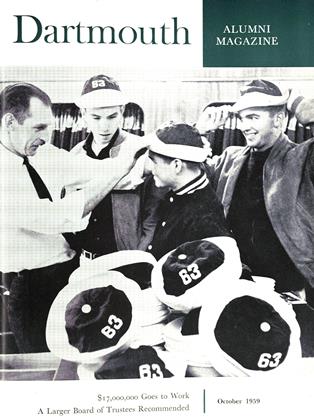It is with sadness and a deep sense ofpersonal loss that the editors record thedeath this summer of their colleague, BillMcCarter '19, who had written this column for the past seven years. In place ofthe column Bill would have contributedto this issue, we print here a tribute written by Irving T. Marsh and printed inthe New York Herald Tribune of July19 , 1959.
When he arose to make a point, or point of order, or a declaration of opinion in the conference rooms of the National Collegiate Athletic Association or the Eastern College Athletic Conference - and he did so quite often because he had a definite point of view - Bill McCarter would often predicate his remarks with "I may be wrong, but I'm not far from it."
Usually, to most of his audience that was a bit of inanity to be puzzled about momentarily and then shrugged off as another of those McCarter aphorisms. But to friends of Bill McCarter, that little crack was a typical McCarterism, a bit of seemingly nonsensical wit for which he was famed in his immediate circle. It was a large circle at that, but it took many years in the making. When it was made, it was strong and sharp. Bill McCarter's friends remained that as long as they knew him.
Bill McCarter died the other day, in the hills of Hanover, N. H., which he had loved with an ardor that dated back to his freshman days at Dartmouth in 1915. He never left Dartmouth for any length of time after that. He taught there, he wrote there, he was director of athletics there from 1938 to 1954.
It was as an athletic director, and a founder of the E. C. A. C. and the Ivy League, that this reporter came to know McCarter—erudite, scholarly, urbane, with a keen although somewhat unorthodox wit, a philosopher with a deep awareness of human nature and thus of human frailties. He was tremendously serious about college athletics, but made no bones about the fact that the overall function of a college is more than to turn out good football teams and good football players. But athletics were, he insisted, one college function.
At a talk to football officials in Philadelphia a few years ago, when intercollegiate athletics were rocked by scandal, he had this to say:
"This is a gloomy picture. It is all worth it, or was the University of Chicago right and we are no good. My answer is that it is worth it. There are saving graces. What I have said does not apply universally. Many institutions, and many fine men in the athletic world, a majority of them, have done a fine and honest job in administering their programs, but all are in danger of being judged by the errors of some.
.. Intercollegiate athletics have done and can continue to do, under reasonable control, many grand things in our colleges' contribution to the life and development of their sons. In addition to the considerable physical and spiritual rewards for the players themselves, college athletics are the most, if not the only, effective unifying emotional agency that exists for college undergraduate and alumni bodies. And those college administrators who, rightly, call for a moral and spiritual revivification, cannot disregard their most powerful aid and ally - the emotional entity that constitutes college spirit."
In his later years, McCarter wrote a monthly column, called "The Hanover Scene," for the Dartmouth alumni magazine. A couple of years ago, his columns were published in book form under the same title. In these, the urbane McCarter wit, a good deal of it poked at himself, achieved full rein.
"Friendly and charitable thinking about our fellow man," he once wrote, "proves a most delightful form of self indulgence, and we commend it to ourself whenever we think of it - possibly three or four times a month. Let those who will praise the good old days. We are all for the good new days when we can get them."
Along the same lines: "We can be as self-centered as the next fellow, and assume we have an unlimited number of gear ratios selected by a magic brain. But we do not hold with the conclusions of a statistical study from M.I.T. proving that people are no damn good. We like people a greater part of the time, and we think the class of 1957 holds more current promise than the class of 1857, or even the class of 1919.
" 'And ye, red-lipped, and Smooth-browed;list, Gentlemen;Much is there waits you we have missed;Much lore we leave you worth Theknowing,Much, much has lain outside Our ken:Nay, rush not: time serves: we Are going,Gentlemen.'"
That well could be Bill McCarter's epitaph.
 View Full Issue
View Full Issue
More From This Issue
-
 Feature
FeatureReport on Trustee Organization
October 1959 -
 Feature
Feature$17,000,000 Goes to Work
October 1959 By CLIFFORD L. JORDAN '45 -
 Feature
FeatureFour-Star Summer
October 1959 By JIM FISHER '54 -
 Article
ArticleEducation: Creator of Centennials
October 1959 By PRESIDENT JOHN SLOAN DICKEY -
 Article
ArticleTHE FACULTY
October 1959 -
 Article
ArticleFootball
October 1959 By CLIFF JORDAN '45
Article
-
 Article
ArticleCollege Receives Two Gifts Totaling $36,254
November 1950 -
 Article
ArticleGreat Issues Questionnaire and Alumni Answers
February 1953 -
 Article
ArticleWith Big Green Teams
December 1957 -
 Article
ArticleThe College
September 1975 -
 Article
ArticleMedical School
October 1959 By HARRY W. SAVAGE, M' 27 -
 Article
ArticleAlms for Blissful Calm
SEPTEMBER 1982 By Peter Smith

